|
CHAPTER 5
Back To New York.
It was my first cross-country drive in the DeSoto convertible. I was
headed
North-East for Elmira, in up-State New York. I wanted to put all
those turbulent
years behind me and look over the possibilities of opening my own
dance school
there.
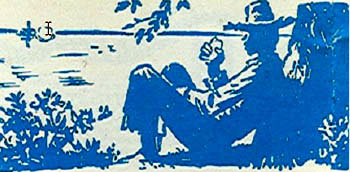 Why Elmira? Elmira is a city most known for
Mark Twain, who lived
there and is
buried there. He called this beautiful county ‘the garden of Eden’
and there
wrote his greatest works: Adventures of Tom Sawyer, Huckleberry
Finn, The Prince
and the Pauper, A Connecticut Yankee and more. Why Elmira? Elmira is a city most known for
Mark Twain, who lived
there and is
buried there. He called this beautiful county ‘the garden of Eden’
and there
wrote his greatest works: Adventures of Tom Sawyer, Huckleberry
Finn, The Prince
and the Pauper, A Connecticut Yankee and more.
The study where he wrote his books, designed as a replica of a
Mississippi
riverboat pilot-house still stands on the Elmira College campus,
which was the
first American college to grant women degrees equivalent to those
given men.
 I thought it could be a good place to start a school, and reasonably
close to New
York City. Yet, I kept wondering if I should really settle down to
teach quite
yet? I was still young and a good dancer and had even learned tap
and jazz
dance. So after a week looking around I sped off to New York City
once again and
got settled in Greenwich Village. Romney Brent the director back at
the Muny
lived next door, but he was busy at the time acting in a TV soap
opera. I didn't
want to bother. I thought it could be a good place to start a school, and reasonably
close to New
York City. Yet, I kept wondering if I should really settle down to
teach quite
yet? I was still young and a good dancer and had even learned tap
and jazz
dance. So after a week looking around I sped off to New York City
once again and
got settled in Greenwich Village. Romney Brent the director back at
the Muny
lived next door, but he was busy at the time acting in a TV soap
opera. I didn't
want to bother.
Photo: Mark Twain's Study |
A Most Unusual Show!
I went to an audtion for two choreographers, Hale and Arlen. It was
the usual
'cattle call' with about a hundred other dancers, but I was chosen
with two other
boys and three girls. It wasn't clear what kind of a show it was nor
where we
were to perform, but it was at least a union show, so I had to join
AGVA - The
American Guild of Variety Artists. Now there were two unions I
belonged to.
We rehearsed in various Broadway studios and learned a jazz number,
then an
oriental number, and so on.
An odd woman kept coming to watch. We were told she was an 'angel',
a theatrical
term for a backer. Naturally, as hopeful dancers we all sat at her
feet in false
adoration. After all, she had suddenly emerged as our benefactor.
Word finally came that we were to open in Memphis and the girls
joyfully, but too
quickly sent their trunks on to the theater there. Well, the whole
thing was just
a run- around. The zinger was that, unknown to us, we were actually
going to be
part of a burlesque show!
Our ‘patroness’ was in reality a burlesque queen who had enough
backing to open
her own theater in Union City, New Jersey, just across the river
from Manhattan.
Burlesque at that time was illegal in Manhattan.
So, why use really trained dancers for this, and boys as well? We
dancers were
suspicious, sensing it was not too aboveboard, but it was a job so
we didn’t
question it too much. . After all, we were just going to be dancing
as background
for the strippers and our girls certainly wouldn’t have to do any of
that sort
of thing. They were trained ballerinas. We all desperately needed a
job. Why not
give it a try?
As it turned out, Lola - our angel’s stage name, had a desire to
produce an American version of “Les Folies Bergère" which she had once seen in
Paris.
There, both boy and girl professional dancers appear in elaborate,
high-class
production numbers, very unlike the American version of burlesque
which was
considered trashy and vulgar. Her own backers appeared to me to be
the Mafiosi -
at least a lot of sleazy looking characters had started hanging
around.
The show opened. We boys breezed through our jazz dance numbers just
as if we
were in a regular Broadway show. Changing into a tuxedo, I even had
to sing
‘Lullaby Of Broadway’ along with the brassy orchestra, during one of
the strip
acts. At least I had a mike.
As expected, one of our girls, a long time and talented student of
Doukadovsky in
Carnegie Hall, had to endure shouts of ‘take it off’ during her
impeccable 32
fouettés and she never missed a beat.
During our second week, Thanksgiving Day arrived. Benevolent Lola
ordered a
catered dinner for everybody. We dancers sat at tables backstage,
right along
with the burlesque queens and show’s comics as if it was all quite
natural! Quite
an experience!
It was three or four shows a day and by the third week I’d had
enough. I think we all did. Fred Astaire was looking for a teacher
for Syracuse, New York so I quit the show to teach ballroom and tap
dancing there until Spring.
Opening and Closing my very
own Dance Studio
Returning to Elmira, still with hopes of opening my own dance
school, I found a
studio space that was above Dr. Scholl’s - a store selling
corrective shoes and
foot accessories. “Feet Hurt?” was their slogan sign on the front of
the building
on Main Street, placed directly under my own sign announcing “Dick
Holden’s
Ballet Arts Studio”. Not very inviting I thought, but even so,
within two weeks I
had a sizable enrollment. Within a month, and with the help of some
highly
impressed mothers, I had enough students to open a branch studio in
the nearby
town of Horseheads.
Science fiction movies being the rage during the 1950s, my first
recital had an
outer space theme. I believe I was the first use this for a dancing
school
recital and the first to use a reel-to-reel tape recorder - rather
innovative at
the time. The show was a tremendous success and brought in more
students.
During the summers I attended
week long dance teacher conventions held in first class New York
City hotels. Outstanding instructors were brought in to show their
teaching methods and materials to the hundreds of members that
filled the immense ballrooms. A faculty teacher one summer was Kyra Nijinska, daughter of Vaslav Nijinsky, my boyhood inspiration
since the Braintree days. I certainly didn’t want to miss this one.
Kyra arrived wearing a kimono, took one look at all the teachers
assembled and waiting, then decided then and there she didn’t want
to have anything to do with us and walked off the teaching platform!
This was a great disappointment but Kyra was always considered,
well, a bit odd. There was an un-kind saying going around that she
was even crazier than her father!
With all the notated teaching material for jazz and tap that I
received at these conventions, plus my knowledge of a ballet
syllabus, my enrollments increased so much that I had to move the
studio to larger quarters.
The Jewish Community Center created a beautiful studio for me in
their building that ideally had a small theater on the premises
where I could produce my spring shows.
The other teacher in town was Madam Halina, a Polish war bride who
had a long established school. She taught her classes wearing an
enormous tutu, claiming it was what the children and parents
expected. Maybe so, but that would be considered quite ridiculous
for a teacher to wear in any authentic ballet school.
Although I already had the professional background she could never
claim, she considered me a newcomer, a young upstart. There
certainly was rivalry.
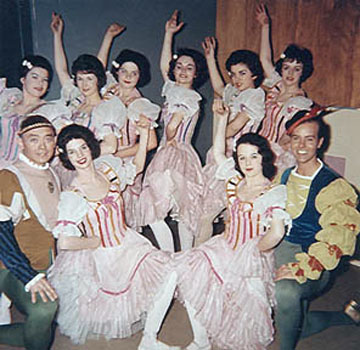 The Corning Glass Center invited me to choreograph the musical ‘Kiss
Me Kate” for their professional theater. I had to go to Eaves
Costume warehouse in New York City to choose costumes for the
dancers. I used my own students plus a couple from Madam Halina, and
danced in it myself. Eaves was where I went a few years earlier to
be fitted after I joined the St. Petersburg Operetta, my first
Actor’s Equity show. “Kiss Me Kate” was one of the shows I danced in
during that run in Florida, to Jamie Jamison’s choreography. Now I
was staging it myself. The Corning Glass Center invited me to choreograph the musical ‘Kiss
Me Kate” for their professional theater. I had to go to Eaves
Costume warehouse in New York City to choose costumes for the
dancers. I used my own students plus a couple from Madam Halina, and
danced in it myself. Eaves was where I went a few years earlier to
be fitted after I joined the St. Petersburg Operetta, my first
Actor’s Equity show. “Kiss Me Kate” was one of the shows I danced in
during that run in Florida, to Jamie Jamison’s choreography. Now I
was staging it myself.Photo: My
students and myself in “Kiss Me Kate" |
Camp Minnowbrook
During summer months I closed the studio and became
the dance director and choreographer at a Science and Arts camp in
Lake Placid, New York. Camp Minnowbrook was on the far side of the
lake and you could get to it only by small boat. Kate Smith, famous
during the 40s for her “God Bless America” hit song, lived on one of
the small islands and would always wave as we rowed past. Composer
Victor Herbert had also lived at Lake Placid back in the late 19th
century.
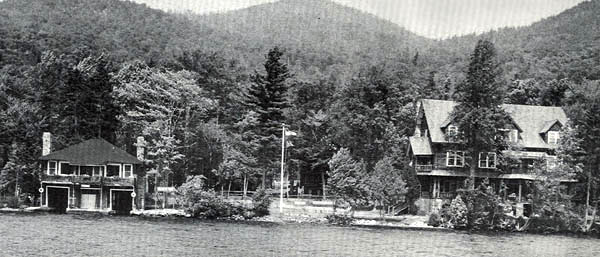
Photo:
A view of Camp Minnowbrook. Boat house on left, main house on right.
The all-Jewish camp was run by Paula and Lothar Epstein whom I had
met in Ithica. During the winter, Lothar was a pussy-cat but during
the summer months he turned into a genuine Nazi running a
concentration camp! He scheduled and regimented everything down to
the bone. I got on well with him as I just did my job and minded my
own business, a trait that did me very well later on in life.
In addition to myself as the dance instructor, there were drama and
music teachers, a conductor and science teachers. Also a cook, a
nurse and scholarship students who served as our waiters, one
assigned to each table. I taught modern, ballet and jazz dance
classes. We had one day off every two weeks. Then I would go into
town where I had parked my car and drive off anywhere to relax from
the constant turmoil of the camp.
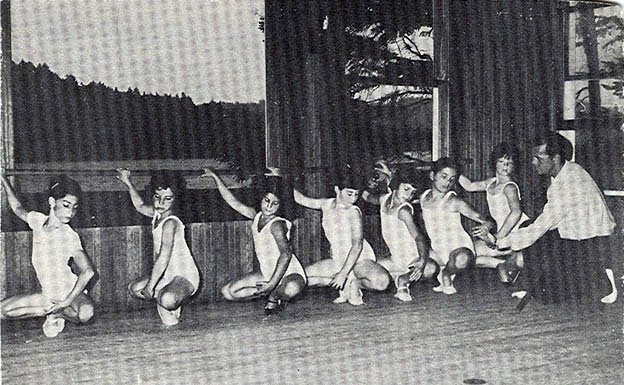
Photo: Teaching a class in the boat house with a view of Lake Placid
from the window.
At the end of each summer I had to produce a dance performance for
the parents who came up from New York City to see their children.
There were only girls in the dance program.. The camp had a rather
good student orchestra and owned a large collection of music scores.
This meant I had to choreograph only dances that had orchestra parts
for them to accompany us with, ‘Midsummer Night’s Dream”,
“Polovetsian Dances”, “Sadko” - these were some of the dances I
prepared, rehearsing them often on the tennis court in the hot sun.
Imagine, teen-age Jewish girls in tunics with bows and arrows as
Tartar warriors! They put their hearts and soul into it and it was
really quite good.
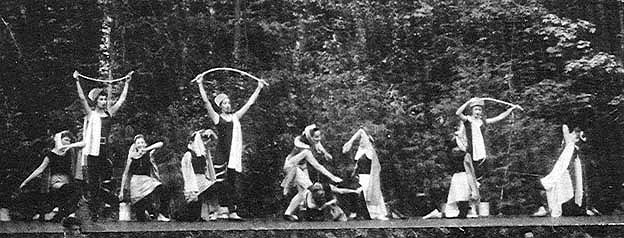
Photo:
Rehearsing on an outdoor stage
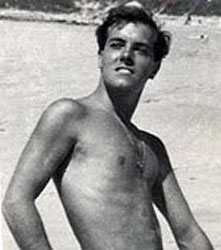 For these six-week stints I was paid a magnificent sum of $600. But
the food was good and with the wholesome life style and exercise I
always returned refreshed and healthy to face another year in
Elmira. For these six-week stints I was paid a magnificent sum of $600. But
the food was good and with the wholesome life style and exercise I
always returned refreshed and healthy to face another year in
Elmira.
About this time my mother died. The last time I had seen her alive
was when she was nearing 70, living alone in New Bedford,
Massachusetts. She had re-married but was again left a widow.
Perhaps this final marriage was the only happiness she ever had. She
had led a hard and loveless life. Through it all she somehow
maintained a strength to survive that I must have gained from her.
I never knew her as young as she was nearing forty when I was born.
To me she always seemed an old lady. It was an ambivalent
relationship. I had a very short childhood as by age fifteen I was
working and struggling to keep my idealism alive in the face of the
grinding poverty.
She was a true story- teller and during my early childhood would
often relate to me stories of her youth, growing up in Carolina,
either North or South she never said. Or how she, Cinderella like,
had a stepmother who was cruel to her. How when she lived in
Melrose, Massachusetts she was a playmate of the opera singer,
Geraldine Fararr , who became world famous during the early 1900s.
Then mother became a nurse and married Sam Holden, a Boston
policeman. Later on, she treated me perfunctorily and left so much
unspoken.
She came to New York City once, during the time I was working at the
Roxy. I knew only too well the hard life she had endured, yet still
faced her problems with humor and pride. I thought it would be
wonderful if she could stay in New York and I could take care of her
and try to bring some happiness into her last years. The problem
was, I could then barely survive myself.
I was still young, perhaps too young to settle down to teach in a
small city such as Elmira, however pleasant. I didn’t feel I could
live without dancing in my life, but not in that kind of situation.
I closed the school and went back to New York City.
Europe was beckoning me. What were the forces that led me to decide
on leaving America? I had always felt that I would be more at home
in England. It was a big decision. Meanwhile, I took some classes in
the Carnegie Hall studio of Maria Nevelska,
I was living off the money from Minnowbrook and enjoying the classes
and a beautiful Autumn in New York. It was time to leave for London.
|
|
|
|
Copyright ©2006-2021 OKAY Multimedia |
|
|
 Why Elmira? Elmira is a city most known for
Why Elmira? Elmira is a city most known for
 I thought it could be a good place to start a school, and reasonably
close to New
York City. Yet, I kept wondering if I should really settle down to
teach quite
yet? I was still young and a good dancer and had even learned tap
and jazz
dance. So after a week looking around I sped off to New York City
once again and
got settled in Greenwich Village. Romney Brent the director back at
the Muny
lived next door, but he was busy at the time acting in a TV soap
opera. I didn't
want to bother.
I thought it could be a good place to start a school, and reasonably
close to New
York City. Yet, I kept wondering if I should really settle down to
teach quite
yet? I was still young and a good dancer and had even learned tap
and jazz
dance. So after a week looking around I sped off to New York City
once again and
got settled in Greenwich Village. Romney Brent the director back at
the Muny
lived next door, but he was busy at the time acting in a TV soap
opera. I didn't
want to bother.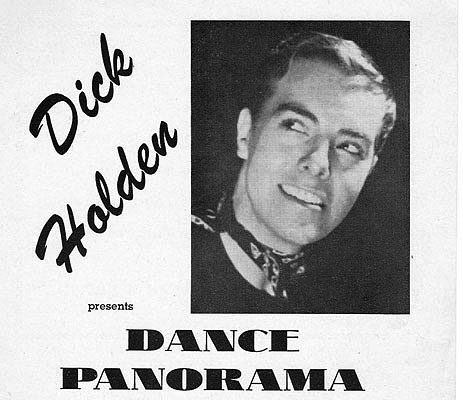



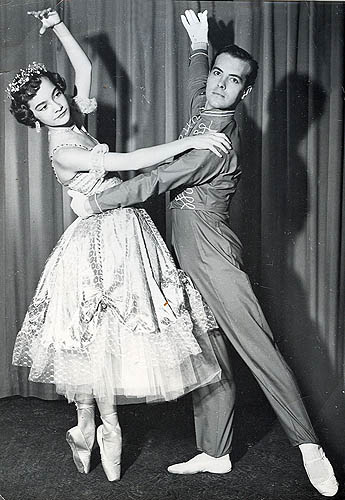
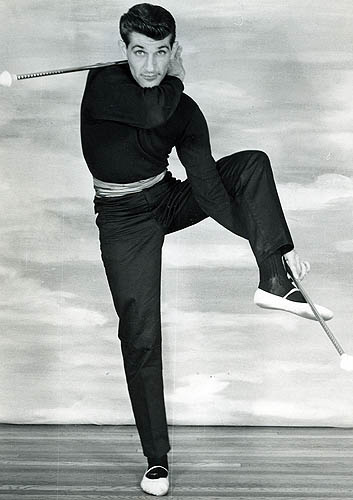
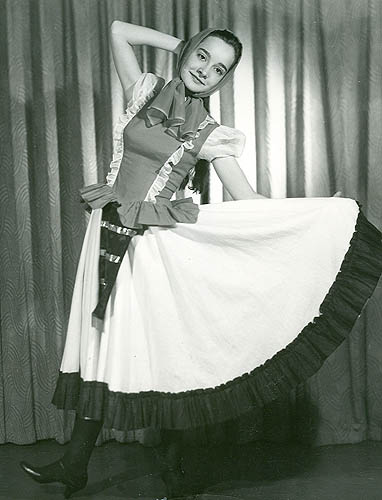

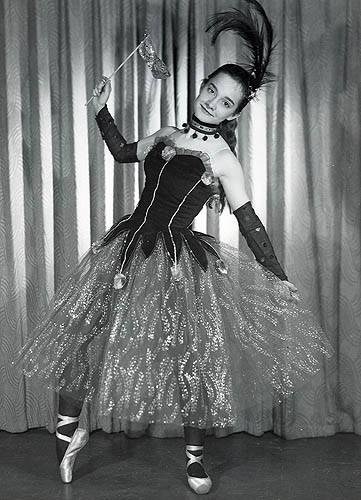
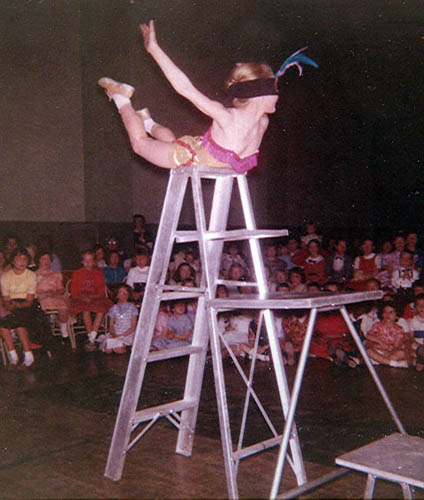
 The Corning Glass Center invited me to choreograph the musical ‘Kiss
Me Kate” for their professional theater. I had to go to Eaves
Costume warehouse in New York City to choose costumes for the
dancers. I used my own students plus a couple from Madam Halina, and
danced in it myself. Eaves was where I went a few years earlier to
be fitted after I joined the St. Petersburg Operetta, my first
Actor’s Equity show. “Kiss Me Kate” was one of the shows I danced in
during that run in Florida, to Jamie Jamison’s choreography. Now I
was staging it myself.
The Corning Glass Center invited me to choreograph the musical ‘Kiss
Me Kate” for their professional theater. I had to go to Eaves
Costume warehouse in New York City to choose costumes for the
dancers. I used my own students plus a couple from Madam Halina, and
danced in it myself. Eaves was where I went a few years earlier to
be fitted after I joined the St. Petersburg Operetta, my first
Actor’s Equity show. “Kiss Me Kate” was one of the shows I danced in
during that run in Florida, to Jamie Jamison’s choreography. Now I
was staging it myself.


 For these six-week stints I was paid a magnificent sum of $600. But
the food was good and with the wholesome life style and exercise I
always returned refreshed and healthy to face another year in
Elmira.
For these six-week stints I was paid a magnificent sum of $600. But
the food was good and with the wholesome life style and exercise I
always returned refreshed and healthy to face another year in
Elmira.